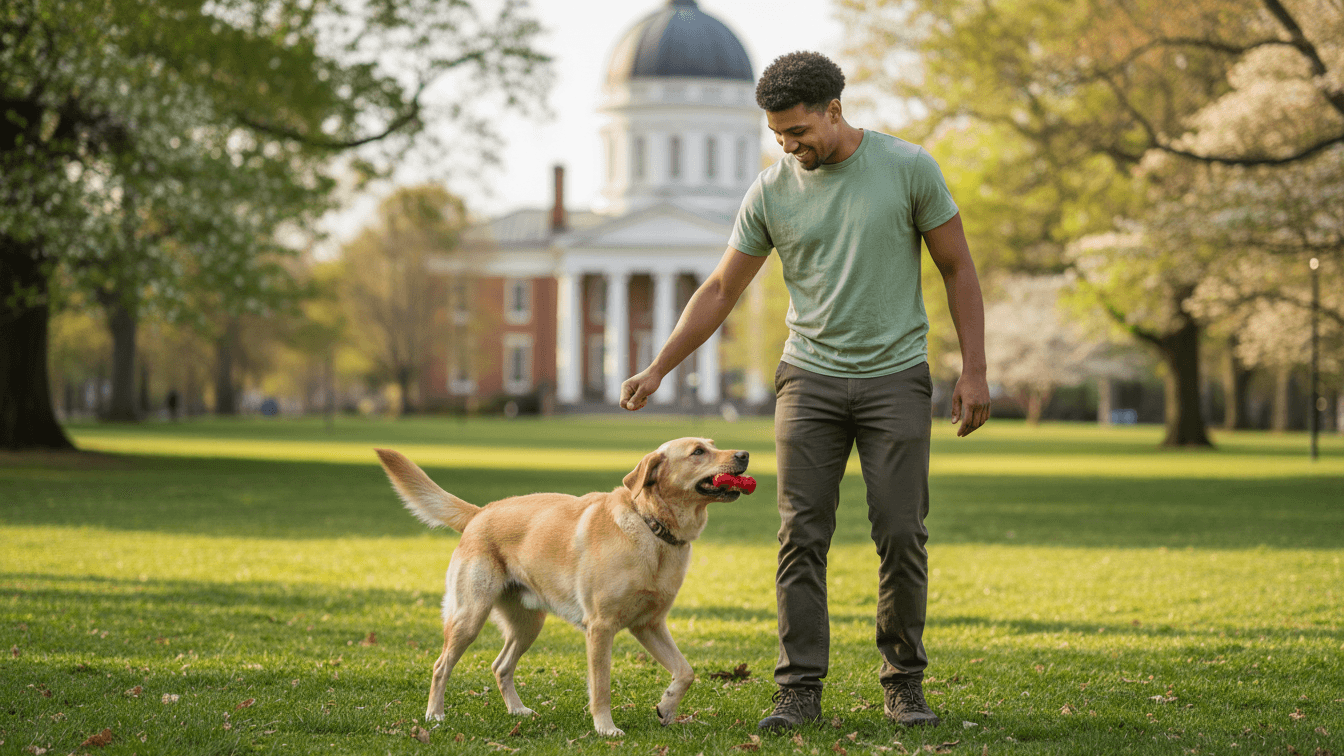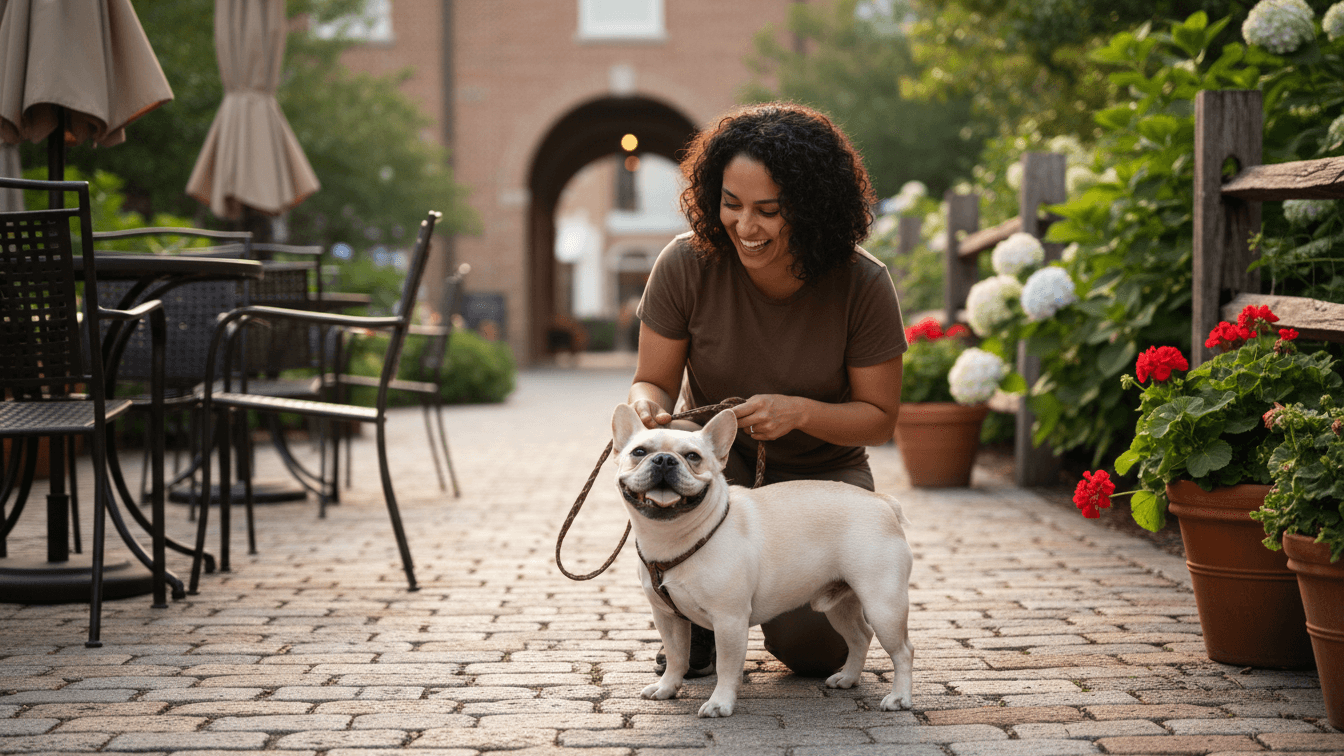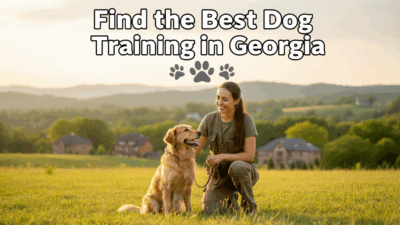Your Complete Guide to Choosing a Dog Trainer in Georgia
Finding the right professional dog trainer in Georgia means understanding how to navigate both metro Atlanta’s busy streets and quiet small-town squares across the state. Whether you’re working on basic obedience for a new puppy in Savannah’s historic squares or addressing reactivity during walks through Athens parks, Georgia’s diverse landscape offers unique challenges for dog owners.
Training for dogs in Georgia requires consideration of everything from humid summers that affect outdoor training schedules to local regulations that vary significantly by city and county. A trainer who understands your specific community will help your dog succeed both at home and out in public.
How to Choose the Right Trainer
Start by looking for someone who uses positive reinforcement training and understands Georgia’s climate and lifestyle demands. Your dog needs to handle everything from farmers’ markets in smaller towns to crowded festivals in larger cities, all while staying calm and focused.
Credentials help you compare trainers quickly and reliably. Look for certifications like KPA-CTP, CPDT-KA, or IAABC-CDBC for behavior issues. If your dog shows serious aggression or fear, consider someone with CBCC-KA or advanced credentials through programs like CTC.
In-home dog training works especially well for puppies learning house manners, dogs who get overexcited at doors, and leash walking practice in your actual neighborhood. Group classes make more sense once your dog can focus around distractions and other dogs, preparing them for real-world situations like outdoor restaurant patios.
Expert dog trainers will assess your dog’s specific needs and recommend a training program that fits your goals. Some offer a free consultation or free evaluation to discuss your situation before you commit.
Ask about continuing education too. Trainers who pursue CPDT-KSA or attend regular workshops tend to stay current with modern, humane methods that get better results.
Common Dog Training Methods Explained

Positive reinforcement builds trust while creating behavior changes that last. These methods also help you meet local expectations for keeping dogs under control in public spaces throughout Georgia.
Basic obedience covers sit, down, stay, place, recall, and leash training so your dog can handle walks through busy downtown areas, visits to outdoor venues, and interactions with neighbors without pulling or jumping. A well-behaved dog makes life easier whether you’re in a small town or a major city.
Puppy training focuses on socialization during critical early weeks, potty training routines, bite inhibition, crate comfort, and early leash skills. Starting young prevents problems from forming and builds confidence before your pup encounters busy parks or downtown sidewalks.
Behavior modification addresses fear, separation anxiety, reactivity toward other dogs, and resource guarding through careful desensitization work. For serious cases like aggressive dog training needs, look for trainers who collaborate with veterinarians and use science-based approaches rather than intimidation.
Private lessons let you customize everything around your schedule and home environment. Day training can speed up results when you’re short on time, with the trainer working your dog during the day and teaching you how to maintain progress.
Dog training classes help your dog practice good manners around distractions. The best group classes screen participants carefully, give dogs plenty of space, and teach calm behavior rather than just excitement.
Service dog training and therapy dog training require structured programs with specific public-access skills and clear benchmarks. These specialized programs go well beyond typical obedience training.
Stay away from trainers who rely on fear, pain, or intimidation. Humane methods are safer, more effective long-term, and better for building the relationship you want with your dog.
Average Cost of Dog Training in Georgia (Updated for 2025)
Prices across Georgia depend on the trainer’s experience, session length, location within the state, and whether you’re in a metro area or smaller community. Here’s what most Georgia dog owners are paying in 2025.
| Service Type | Average Cost (Georgia) |
|---|---|
| Puppy classes (4-6 weeks) | $140-$290 total |
| Group obedience classes (4-6 weeks) | $150-$310 total |
| Private lessons (60-90 min) | $100-$200 per session |
| In-home coaching packages (4-6 visits) | $400-$950 total |
| Day training (trainer works your dog) | $425-$975 per week |
| Behavior consult for reactivity/anxiety | $140-$265 |
| Board and train (2-4 weeks) | $1,900-$4,800 total |
Metro Atlanta trainers typically charge at the higher end of these ranges, while dog training services in smaller Georgia cities and rural areas often cost less. Expect additional travel fees for trainers covering longer distances within their service area.
Make sure you understand what’s included in each training session, how progress gets tracked, and whether follow-up support is available after your initial program ends.
Questions to Ask a Potential Dog Trainer
- What training methods do you use, and how do you keep training sessions positive and low-stress?
- What dog trainer certifications do you hold, and do you participate in continuing education?
- How will you customize the training program for my dog’s personality, age, and specific challenges?
- Do you offer in-home sessions, group classes, private lessons, or day training, and which approach fits my goals?
- How will we measure progress and know when to increase difficulty or add distractions?
- What are the total costs including any travel fees, materials, or follow-up sessions?
- Do you carry liability insurance, and can you provide proof?
- For behavior problems, will you work with my veterinarian if needed?
- What should I practice between sessions to help my dog improve steadily?
Local Georgia Rules and Considerations
Georgia law gives counties and cities authority to set their own rules about leash requirements, noise ordinances, and dangerous dog designations. This means regulations vary significantly depending on where you live in the state.
Most Georgia communities require leashes in public spaces except inside designated off-leash dog parks. Check your local city or county ordinances for specific length requirements and restricted areas.
Georgia law requires current rabies vaccination for all dogs over three months old, administered by a licensed veterinarian. You can find details through the Georgia Department of Public Health’s rabies information page.
Excessive barking can violate local noise ordinances in many Georgia cities. Work with your trainer on alert barking, separation anxiety, and boredom before neighbors file complaints with animal control.
If your certified dog trainer wants to use public parks for commercial training sessions, they may need permits and proof of liability insurance from your local parks department. Requirements vary by municipality.
Georgia doesn’t require special licenses for dog trainers, but the Georgia Department of Agriculture oversees animal care facilities. If a trainer operates a boarding kennel as part of board and train services, that facility must meet state standards.
Most Georgia counties have animal control departments that handle licensing, lost pets, and welfare concerns. Check your county’s website for specific resources and contact information.
Local Georgia Resources for Dog Owners
These locations give you opportunities to practice socialization, work on obedience training, and provide enrichment for your dog. Always follow posted rules and respect other park users.
- Piedmont Park in Atlanta offers large open spaces and designated dog park areas where you can practice recalls and calm greetings during quieter hours
- Forsyth Park in Savannah welcomes leashed dogs and provides excellent opportunities to work on focus around crowds, tourists, and other distractions
- Memorial Park in Athens features trails and green spaces perfect for building leash skills and practicing stays around people and wildlife
- Many Georgia state parks welcome leashed dogs on trails and in picnic areas, offering varied environments for training practice
- Local county parks across Georgia often include dog parks or designated areas, so check your county parks and recreation website for options near you

FAQs
How much does in-home dog training cost?
Most Georgia trainers charge $100-$200 per in-home visit, with package discounts available when you commit to multiple sessions. Behavior modification for issues like reactivity or aggression typically starts at the higher end of that range.
Is in-home dog training worth it?
Yes, because you’re addressing problems exactly where they happen. Your trainer can work on door manners, jumping on guests, counter-surfing, and backyard reactivity in your actual home, then step outside to practice leash skills on your real neighborhood sidewalks.
Can you pay someone to house train your dog?
Many trainers offer puppy programs that include potty training schedules, crate training routines, and management strategies. Day training can speed up the process while teaching you how to maintain consistency.
What is the 3-3-3 rule for dog training?
This guideline helps set realistic expectations for newly adopted dogs. Expect about 3 days for your dog to decompress from stress, 3 weeks to learn your household routines, and 3 months to feel completely comfortable. Good training programs work with this natural adjustment timeline rather than against it.
How long will it take to reach my training goals?
Most puppies and friendly adult dogs show solid progress within 4-8 weeks with daily practice. Fear, reactivity, or aggression typically requires several months of careful behavior modification with gradual increases in difficulty and distractions.
What should I bring to group classes?
Pack a flat collar or harness, a 6-foot leash, high-value treats your dog loves, water, and current vaccination records if your trainer requests them. Leave retractable leashes at home for safety reasons.
What’s the leash law in Georgia?
Georgia state law doesn’t mandate statewide leash requirements, but most cities and counties require leashes in public spaces except inside designated off-leash dog parks. Check your specific city or county ordinances for local rules.
Do I need a dog license in Georgia?
Licensing requirements vary by county and city in Georgia. Many communities require annual dog licenses tied to current rabies vaccination. Contact your local animal control or county government office for specific requirements.
What shots does my dog need in Georgia?
Georgia law requires rabies vaccination for all dogs over three months old. Your veterinarian may also recommend distemper-parvo, bordetella, and other vaccines based on your dog’s lifestyle and risk factors. Check the Georgia Department of Public Health for current requirements.
Are dog trainers required to be licensed in Georgia?
Georgia doesn’t require special licenses for dog trainers. Trainers follow normal business regulations, but if they operate boarding facilities for board and train programs, those kennels must meet Georgia Department of Agriculture standards.
Where can I practice off-leash recall?
Use fenced dog parks throughout Georgia to practice recalls safely and legally. These enclosed spaces let you work on your dog’s response without risk of them running into traffic or getting lost.
Which dog parks allow training around Georgia?
Most Georgia dog parks welcome training practice during off-leash hours. Visit during quieter times when you’re starting out to give your dog the best chance to succeed. Check your city or county parks department website for locations and hours.
What beaches or trails allow dogs for training?
Many Georgia state parks welcome leashed dogs on trails, providing excellent environments for building focus around wildlife and other hikers. Some coastal areas like Tybee Island offer dog-friendly beach access during certain hours and seasons. Check specific park regulations before visiting.
How do I help my dog with separation anxiety?
Work with a professional who specializes in behavior modification for separation anxiety. This issue requires gradual desensitization, careful management, and sometimes collaboration with your veterinarian. Don’t wait for the problem to worsen before seeking help.
What should I look for in puppy classes?
Top dog trainers offer puppy classes that focus on socialization during critical developmental periods, gentle handling exercises, and foundation skills like name recognition and recall. Classes should be small, carefully supervised, and emphasize positive experiences over strict obedience.
The right combination of thoughtful planning, humane methods, and consistent practice will help your dog become a confident companion ready to handle everything Georgia has to offer. Whether you’re navigating busy Atlanta neighborhoods or enjoying small-town life elsewhere in the state, investing in quality dog obedience training pays off for years to come.
